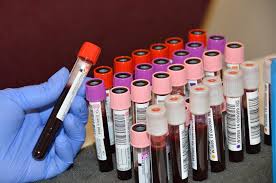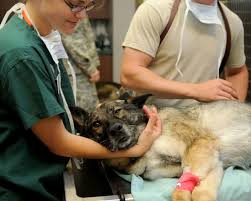You know that humans have different blood types. But do dogs have different blood types also? Yes, they do. In fact, there are 13 blood different types. Dogs and humans do not have the same blood types.
 Dog blood types are denoted by DEA. This stands for Dog Erythrocyte Antigen. Erythrocyte is the scientific name for red blood cells. Antigen refers to the blood protein molecule that is capable of inducing an antibody immune response.
Dog blood types are denoted by DEA. This stands for Dog Erythrocyte Antigen. Erythrocyte is the scientific name for red blood cells. Antigen refers to the blood protein molecule that is capable of inducing an antibody immune response.
The 13 blood types are broken down into eight categories of canine blood types
- 1. DEA 1.1 (positive and negative)
- 2. DEA 1.2
- 3. DEA 3
- 4. DEA 4
- 5.DEA 5
- 6. DEA 7
- 7. DEA 8
Dogs that are DEA 1.1 positive can be considered to be universal recipients. That is they can receive any blood type in a transfusion.
DEA 1.1 negative dogs are universal donors. An interesting fact is that 60% of Greyhounds are this blood type. This is why Greyhounds are popular blood donors.
The determination of blood type is based on the proteins or antigens, that cover the surface of red blood cells. Antibodies within an organism do not react the same to all blood proteins, meaning they do not react the same to all blood types.
Dog blood transfusion
 If a dog needs a blood transfusion the vet will check to see if any other animals on site are suitable donors. Next, they check with animal blood banks. An artificial blood, made from cow hemoglobin, is also available.
If a dog needs a blood transfusion the vet will check to see if any other animals on site are suitable donors. Next, they check with animal blood banks. An artificial blood, made from cow hemoglobin, is also available.
A blood transfusion may be needed in the case of serious bleeding, the destruction of red blood cells due to disease or to treat anemia.
The first blood donation for a dog can typically come from any blood type. Any time after that the donor blood will have to match to prevent possible complications. This is because unlike humans, dogs do not have naturally-occurring antibodies of the opposing blood types in their bodies before the first transfusion.
Dogs can become blood donors just like us. To be able to donor blood a dog needs to weight more than 55 lbs. If they are a female dog, they need to have been desexed and to have never been pregnant. This is because pregnancy can add antibodies to the dog’s blood that might cause rejection by the recipient.
Dog blood type test
The process to determine blood type screens for specific antibodies whose presence or absence acts as recognition for that blood type. Cross matching is where the blood of the recipient and potential donor are tested to see how they would react.
If the donor and recipient blood clump together in a test tube, then the recipient’s blood has antibodies that would attack the donor red blood cells. This means in that situation that the donor blood would be unsuitable for the recipient.
In summary
It is worthwhile for you or your vet to know your dog’s blood type in case of an emergency. The time this could save could make a real difference.
If you are perhaps interested in your dog becoming a blood donor, contact you vet. They should be able to refer you to the right place. You never know. Your dog could save the life of a fellow canine.
Related Posts